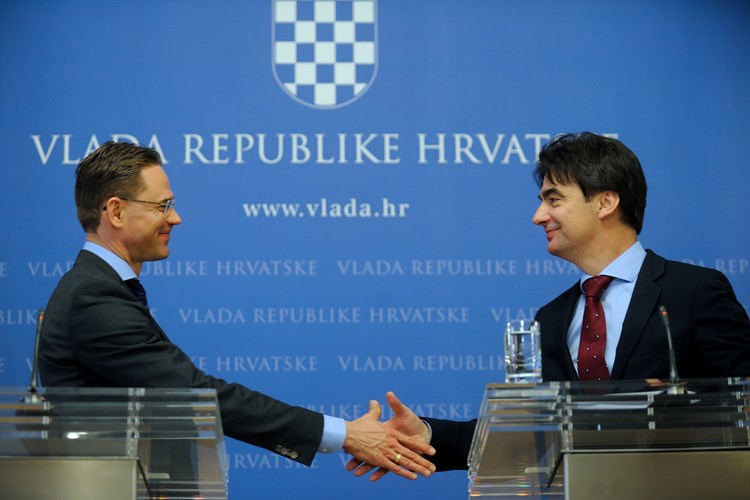- Published: 24.02.2015.
Croatia short-lists some 25 projects for Juncker plan, says Grcic
Croatia's Deputy PM Grcic, said that Croatia had proposed about 25 projects worth 9 billion euros to be financed under the so-called Juncker investment plan, and he expected some 2.2 billion euros from the implementation of those projects in the next three years.
Addressing the media after his talks with the Vice-President of the European Commission responsible for Jobs, Growth, Investment and Competitiveness, Jyrki Katainen, Grcic recalled that initially, there had been 77 Croatian projects in the pipeline for consideration for the European Commission’s Investment Plan for Europe announced by European Commission President Jean-Claude Juncker in November 2014.
In the meantime, Croatia short-listed them to some 25 projects which it deems to be of strategic importance, and the private sector has been invited to be engaged in their implementation through public-private partnership.
The Juncker plan aims at unlocking public and private investments in the real economy of at least EUR 315 billion over a three years fiscal period.
"Therefore, in the coming days we are going to call on potential private investors to show their interest in participation in this initiative, and the Croatian government will be their support in the communication with the European Commission and the European Investment Bank in implementing those projects," Grcic told the press in Zagreb.
The Croatian official said that his country was primarily interested in investments in energy and projects such as an LNG terminal on the island of Krk or the Adriatic-Ionian gas pipeline, as well as in infrastructure including rail infrastructure overhaul and the development of broadband infrastructure and access throughout Croatia.
Katainen said that the purpose of the EC plan was to foster the further development of the single European market, notably those segments that have not yet been fully harmonised, such as the energy sector, the capital sector and Digital Economy.
The plan envisages the establishment of a European Fund for Strategic Investments (EFSI) in close partnership with the European Investment Bank (EIB).
The EFSI is perceived as the main channel to mobilise at least EUR 315 billion in additional investment in the real economy over the next three years.
This fund will have 16 billion euros at its disposal for co-financing projects with a higher risk profile, primarily in the private sector, according to Katainen who underscored that the EFSI will not offer non-repayable grants but that it will lend these funds.
In a bid to dispel fears from some small EU member-countries that there would not be enough money under the scheme, the EC Vice-President said that any sustainable project would stand a good chance to be financed, regardless of where it comes from.
(Hina) ms
.@jyrkikatainen My main message is to private investors - there are new opportunities. I firmly believe Croatia will profit from #InvestEU
— Vlada R. Hrvatske (@VladaRH) February 23, 2015
